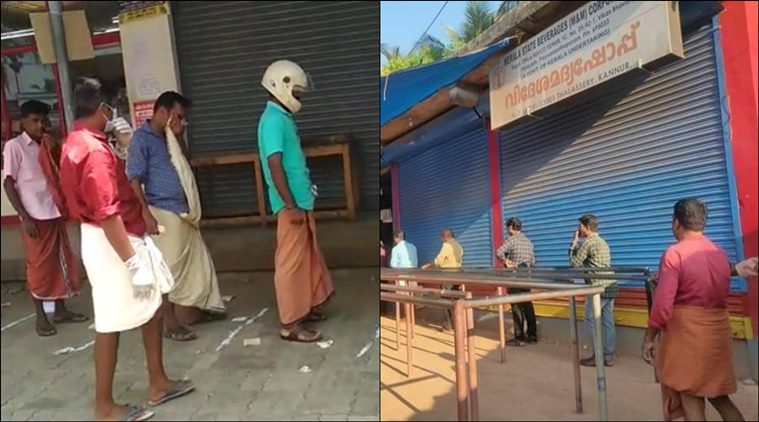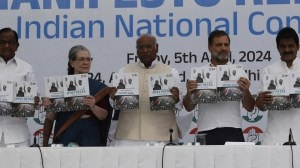- India
- International
Kerala’s alcohol de-addiction programme faces its toughest test amid lockdown
The state had downed shutters of the retail outlets dispensing liquor as well as bars and pubs on March 25, hours after Prime Minister Narendra Modi announced a nationwide lockdown to combat the spread of coronavirus.
 Customers were seen queuing up in front of liquor shops to buy alcohol but maintaining a strict gap as lines were drawn on the ground to guide them. (File Photo)
Customers were seen queuing up in front of liquor shops to buy alcohol but maintaining a strict gap as lines were drawn on the ground to guide them. (File Photo)
Kerala’s alcohol drug de-addiction programme, Vimukthi, run by the excise department is perhaps facing its most formidable challenge yet with a spurt in cases of people suffering from withdrawal syndrome as a result of the ban on liquor. The state had downed shutters of the retail outlets dispensing liquor as well as bars and pubs on March 25, hours after Prime Minister Narendra Modi announced a nationwide lockdown to combat the spread of coronavirus.
In the last one week, the centralised counselling helpline number of Vimukthi has been flooded with calls, many desperately asking how they could get their hands on a bottle, others reporting minor problems of shivering, sleeplessness to extreme cases of epilepsy and delirium. Anticipating fresh cases of admission, the de-addiction centres, in each of the 14 districts, have been padded up with extra wards of 10 beds each. At least seven people, with a history of alcohol addiction, have taken their own lives since the lockdown began.
Dr Lisha, a psychologist at Vimukthi’s counselling centre in Thiruvananthapuram, said her team handled over 500 calls from people reporting withdrawal symptoms as well as their family members since March 24. The calls peaked around March 27-29, when the withdrawal syndrome would have kicked in post lockdown, before they marginally reduced over the past week.
“From the 500 callers, over 200 of them required urgent medical attention. We referred them to the nearest primary health centre or taluk hospital. We do detailed follow-ups as well. If these cases are not handled at the taluk level, they are admitted to the de-addiction centres,” she said.
Read | Why Kerala is hesitant to enforce total ban on liquor

Among her callers were anxious wives complaining about their husbands turning violent and aggressive. In several families, physical altercations were erupting. There were those who were complaining of hallucination, of seeing people that weren’t there and believing things that didn’t exist. Others reported sleeplessness and shivering.
“Most of them were ready to go to hospitals and get medical help. But among the elderly population, who are above the age of 60, there’s a refusal to go to a doctor. One woman, whose husband was above 60, was complaining that he just wouldn’t go to a doctor. Even if he had fever, he would resort to drinking. Such cases are difficult,” said Dr Lisha.
In Ernakulam district, a top excise official said the severity of withdrawal syndrome was manifesting in the most extreme of delirium cases.
“We got a call about a person who was running through the streets crying out loud that somebody was about to kill him. He was entering other houses and trying to hide under the bed, fearing he was being attacked. In another case, we found an addict tied up by his family because he had bludgeoned his head. His hair was dishevelled and there was blood everywhere. All these cases require urgent medical attention,” the officer said.
In Ernakulam district alone, at least 50 people have been referred to government hospitals of which five persons are under treatment at the de-addiction centre in Muvattupuzha, a town on the fringes of Kochi. The district has reported two suicides already, by a coconut palm climber in Pallikkara and a daily-wage labourer in Paravur.
“Both were heavy drinkers. Post-lockdown, when they couldn’t find alcohol, they hanged themselves. The FIRs have pointed to a history of addiction in both cases,” the officer said.
Before the national lockdown fell into place, Kerala’s CPM-led government was reluctant to shut down around 330 retail outlets of the state-run liquor monopoly BEVCO despite calls by Opposition leaders and doctors’ associations to do so for multiple reasons. One, alcohol is among the highest revenue garnering commodities in the state. Two, it feared there would be a flow of illicit liquor into the state. Three, the government was anxious about withdrawal syndrome kicking in, among alcohol dependents, and the added pressure it would place on an already wobbly healthcare system dealing with a pandemic.
To combat such fears, the government had proposed a plan to provide alcohol in limited form to those reporting alcohol withdrawal symptoms if they can produce a doctor’s certificate. The doctors’ associations immediately mounted resistance to the idea, stating that it was unethical for them to prescribe alcohol to those suffering from withdrawal. They went to the High Court this week, whose two-judge bench promptly put a three-week stay on the government order, calling it a ‘recipe for disaster’.
Read | Kerala government to issue special passes for tipplers to get liquor
According to studies, only about five per cent of alcohol users in Kerala match the criteria of dependence which denotes addiction to alcohol and require treatment. In mild dependence, they may experience sleeplessness or shivering of hands, which will persist for a few days. But around 10 per cent of those who go through withdrawal can go into complicated withdrawal.
“Delirium is one instance of complicated withdrawal where the person is basically disoriented. He/she has no sense of time or place. They may have memory problems. They are at a risk of harming themselves and others. Delirium therefore has a mortality risk,” said Dr Sebind, secretary of the Kerala branch of the Indian Psychiatric Society.
“Delirium can be controlled completely if the person is provided proper medical help. There are clear guidelines for that. But in the present situation of a lockdown and the sudden shutting of retail liquor shops, we are not sure whether they will get that help. If a person goes into delirium and does not get help, he may die,” he added.
Apr 25: Latest News
- 01
- 02
- 03
- 04
- 05








































